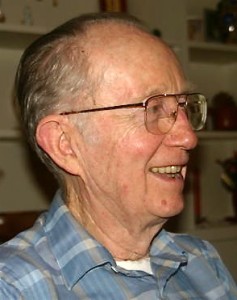
I just happened to be in the right place at the right time. Well, and I was brave. I was attending the Emergent Village Theological Conversation a few weeks ago and just loving the conversation about Process Theology.
On several occasions I was hovering around waiting for a chance to talk to John Cobb, a well-known process theologian who has now been retired for 20 years. I wanted to thank him for his thought-provoking presentations and to ask him a question or two.
But of course many people wanted to do the same thing. I gave up several times, told myself it wasn’t important, walked away and circled back, hung around while someone else video-taped him, then had my opportunity.
After thanking him for his presentations I said that I would love to ask him a few questions at some point. (That was the brave part.) He said, “How about now? I’m about to have some lunch.” I felt like the luckiest person in the world.
That meal was like sitting down for a lunch-time chat with Jimmy Carter about world politics. Let’s just say, John Cobb has thought through a few issues. I came away from that lunch with a great deal of admiration for him as a thinker and tremendous respect for him as a kind and generous human being.
The thing that was most moving and helpful for me, though, was the depth of his Christian faith. He spoke with conviction about the importance of Christ, even while he described an openness to learning about God through the insights of non-Christians. Dr. Cobb affirmed certain core convictions of Christianity, but reframed them in such a way that I felt liberated.
It was as though he was pointing to a window looking out onto a landscape I had never seen. What process theology has given him, he said, is a language with which to speak about God and Christ which doesn’t require him to hand over his rationality. And yet, his “rationality” is not limited by old categories.
Everything he spoke of, he presented with humility, acknowledging the imperfection of his knowing, but never hesitating to seek a greater understanding of God. He said that all of us who speak about God are merely speculating, but he believes that we are called to speculate!
After lunch, as I listened to more presentations and began reading his books, I saw that all my questions have been asked many times before. I was right on track with the questions so many people have.
I asked some big questions like: How do you understand the incarnation? How was God present in Jesus? How does what Jesus did then relate to us now? To answer them, he always began by reframing the question and undoing my entire (unconscious) metaphysics. What is the world made of? What is existence? What makes a human being?
I won’t be able to even list all the questions here, but I highly recommend that you check out Dr. Cobb’s comments in his “Ask Dr. Cobb” column over at the Process and Faith website.
 Right now I am reading The Process Perspective II. (It’s okay to skip the first one and go right to this one, which is also available digitally.) It gives a simple introduction to Christian process theology and covers basic metaphysics, the nature of God, science, evolution and ecology, the nature of Christ, the problem of evil, and religious pluralism. These are collections of pieces from the “Ask Dr. Cobb” column. He is so conversational in his answers that reading them feels like sitting down for lunch with him.
Right now I am reading The Process Perspective II. (It’s okay to skip the first one and go right to this one, which is also available digitally.) It gives a simple introduction to Christian process theology and covers basic metaphysics, the nature of God, science, evolution and ecology, the nature of Christ, the problem of evil, and religious pluralism. These are collections of pieces from the “Ask Dr. Cobb” column. He is so conversational in his answers that reading them feels like sitting down for lunch with him.
I only wish I had some of that great bok choy and rice we had that day in early February.